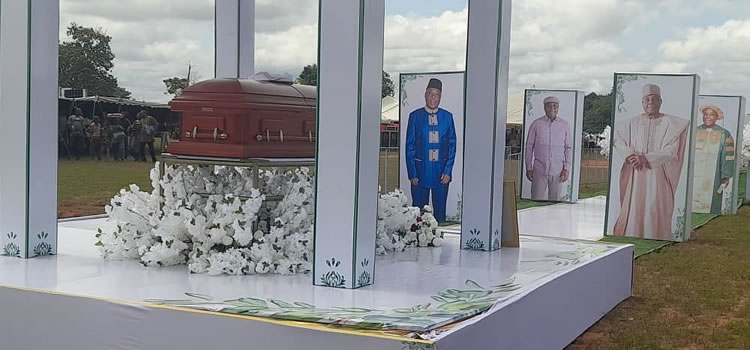ON May 29, as Nigerians celebrated the dawn of a new government, the curtains were sadly drawn on the acts of Chief Raymond Anthony AleoghoDokpesi, OFR, one of Nigeria’s most remarkable national players. The news was received with shock, particularly given the circumstances. Dokpesi had survived COVID-19, deadly as it was, but had suffered a mishap during an exercise routine at home. Quite naturally, given his strides and influence, tributes poured in from around the world. And as he was laid to rest in Agenebode, Edo State, the words of the Bard of Avon, William Shakespeare, resonated once again: “When beggars die there are no comets seen: The heavens themselves blaze forth the death of princes.” It did not come as a surprise that the Senate asked the Federal Government to immortalize the Ezomo of Weppa-Wanno kingdom.
And yes, Dokpesi was buried like a prince with nearly everyone that mattered in the national scheme of things present. He went to his resting place literally in a blaze of glory. But his background was anything but princely: he had to overcome excruciating circumstances, including an inability to speak during his early years, and sheer penury. Born in Ibadan to a polygamist father of Agenebode, Edo State origin and a mother who hailed from the northern part of the country, Dokpesi knew the pain of rejection very early in life. By his own account, certain friends persuaded his father not to send him to school on the false premise that northerners had no aptitude for education. That prognosis was of course false and, in any case, the pull of education was so strong and overwhelming in the Action Group years. His mother sent him to school.
Very early in life, Dokpesi learnt to look adverse circumstances in the face and proclaim a steely resolve, namely to use adversity as a stepping stone to greatness. Like the motto of the Royal Air Force, Par adua ad astra (“Through difficulties to the stars”) proclaims, Dokpesi knew that nothing could be gained from self-pity and resignation to fate; he knew that he could, under God, become the master of his own circumstances. He quickly determined to make a change, and make a change he did. The boy of deprived circumstances rose to become a national treasure, a point of reference for many in diverse fields: engineering, business, broadcast media, even politics. Dokpesi had his hand in many pies; he multi-tasked at a highly phenomenal level and managed to leave lasting imprints. The plaudits that heralded his homeward journey were fully deserved: he will be remembered with fondness for many, many years to come.
Because he died as a wealthy, famous Nigerian, certain facts about his life are known by millions. The fact is well known that he schooled at Loyola College, Ibadan, after which he proceeded to the Immaculate Conception College (ICC) in Benin City, and that he had his undergraduate studies at the University of Benin, from where he left the shores of Nigeria to study at the University of Gdansk, Poland, where he earned his doctorate degree in Marine Engineering. But how many people remember that following the medical examinations to get into the university, doctors said he would not live beyond the age of 35? By his own account, “I collected the results and forwarded them to my father, who kept telling me I should have faith and confidence.”
But after his secondary school education, he had no hope of university education until he chanced upon an advert in a newspaper, where the Nigeria Ports Authority [NPA] was looking for school leavers to be given scholarships to train abroad. That was how his Poland story was began.However, although Dokpesi got the degrees, he had no means of flying back home. According to the veteran journalist, Mahmud Jega, it took the visit of General OlusegunObasanjo to Poland in 1977 to change Dokpesi’s story. Jega wrote: “Obasanjo ordered the Nigerian embassy to provide him with a return ticket to Nigeria and that he should come and see him on getting back home. But once back home, Dokpesi couldn’t get to see the military ruler. He went to the gates of Dodan Barracks but soldiers drove him away. He finally hit on an idea. He wrote a letter to Obasanjo, went to the Post Office and posted it. Lo and behold, Obasanjo got the letter and sent Dokpesi to AlhajiBamangaTukur, managing director of Nigeria Ports Authority, whose special assistant he became.”
Dokpesiserved at the Federal Ministry of Transport and Aviation as the Head of the Water Transport Division on secondment from NPA, between 1978 and1983.He headed the water transport division on secondment from Nigerian Ports Plc from 1978 to 1983. His boss, Tukur, was later elected governor of the old Gongola State and between October and December 1983, Dokpesi served as his Chief of Staff.
At the national scene, Dokpesi was a stabilizing factor. When former President Goodluck Jonathan lost election in 2015, Dokpesi was one of those who served as his motivators, telling him there was life after the election. Indeed, according to the former president, when Nigeria under President Musa Yar’Adua faced financial difficulties over the 2009 FIFAUnder-17 World Cup, it was Dokpesi who saved the day, coming up with an alternative funding arrangement.
As the Executive Director of the ObafemiAwolowo Foundation, I must place on record Dokpesi’s massive support for the Foundation. He did not approach the Foundation with silver and gold, but his acts were golden. He deployed his media resources in propagating the Foundation’sprogrammes and events at no cost. He did this consistently, giving the Foundation wide coverage of its activities. He was a firm believer in the ideals of the Foundation as an engine of social growth, and will be sorely missed.
Despite all odds, all people of conscience will agree that Raymond Dokpesi strived to make a real change in the lives of people around him. May his gentle soul rest in sweet repose.
READ ALSO FROM NIGERIAN TRIBUNE







